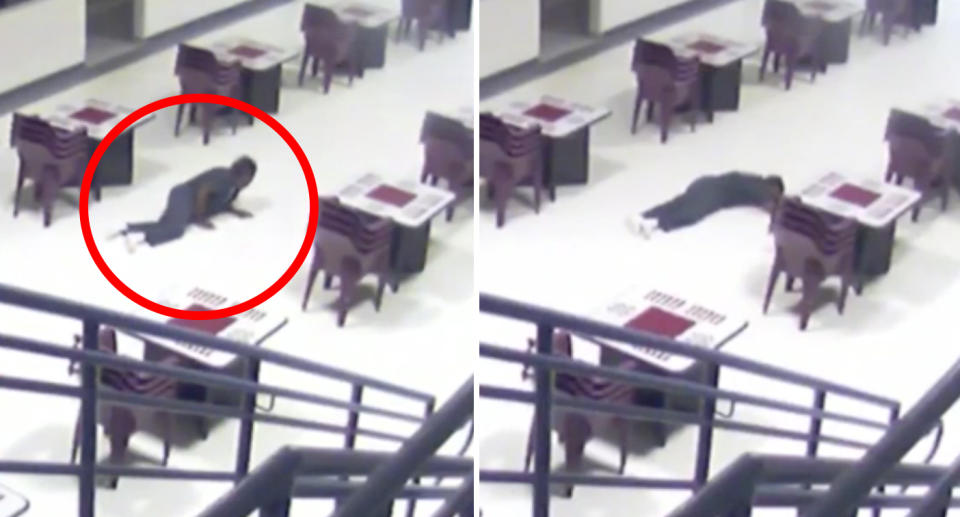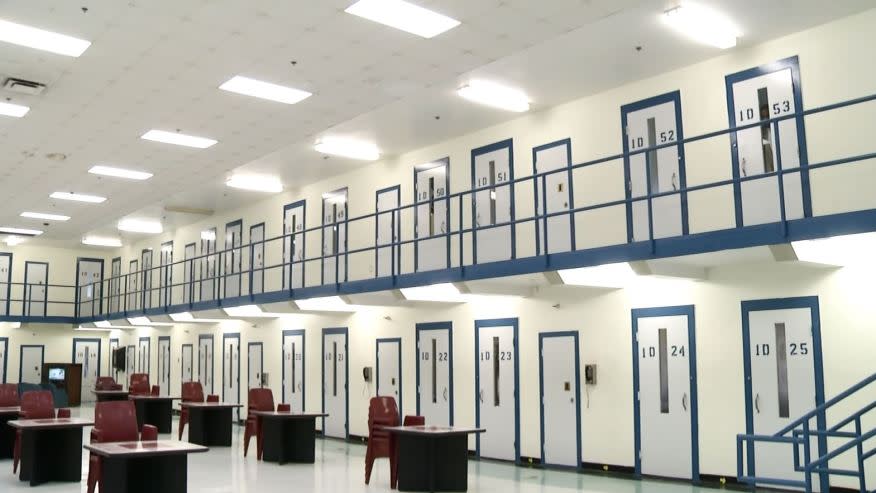Distressing image captures inmate’s plea for help before death
An inmate’s shocking death 32 hours after he crawled across a prison floor begging to go to hospital is one of several cases of alleged negligence facing a US prison healthcare provider accused of putting profits before lives.
Jimmie Lee Alexander, 60, jailed for missing a court date and receiving stolen property, complained to guards about throbbing pain in his right knee and hip in May 2016.
He asked to go to the hospital but his calls were ignored by staff from Corizon Correctional Healthcare at Chatham County Detention Center in Savannah, Georgia.
Instead a nurse prescribed a painkiller and later that night, Alexander crawled to the middle of his wing’s floor, vomited and pleaded again for help.
Distressing CCTV shows Alexander mustering just enough strength in his arms to drag himself slowly across the floor without anyone coming to his assistance. He eventually stops, placing his head face down on the floor.

The nurse phoned Corizon’s medical director, Guy Augustin, who recommended keeping the inmate under close watch at the jail, records show.
The next day, Augustin did not check on Alexander until 2.45pm.
Concerned by the coldness of Alexander’s right leg, Augustin ordered him to the hospital with deputies, not an ambulance. It took more than an hour to arrange his ride and another hour to reach the ER.
Doctors removed a massive blood clot that choked off Alexander’s thigh.
Early the next morning, Alexander suffered a heart attack and died.
He had not been convicted of his charges. A family lawsuit described his leg as gangrenous.
A judge dismissed the lawsuit against the sheriff, nurses and Corizon but ruled the ongoing case could proceed against Augustin and two jailers, who all deny wrongdoing.
In court filings, Corizon and the doctor said they “met or exceeded” standards of care. Augustin declined comment.
Two months after Alexander’s death, Corizon’s contract ended. At midnight July 31, 2016, the keys to the infirmary were passed to another contractor.
Sheriff John Wilcher, who took over that March, said his “first goal” was to change healthcare contractors.
“They just weren't the type of medical people I wanted here,” he told Reuters.
Lifting the lid on a growing industry
An in-depth Reuters review corroborated multiple claims of insufficient care in the prison via previously unreported whistleblower testimony, thousands of court and police documents, interviews with more than a dozen former medical and jail staff, and confidential monitor reports.
In the last years of Corizon’s watch from 2014 to 2016, prescription drugs went missing, patients deemed gravely ill by medical staff were denied hospitalisation, mentally ill inmates went untreated and records were falsified, Reuters found.
Weeks passed with no doctor on site, leaving care to nurses and video calls with doctors. The jail’s 400 mentally ill inmates, nearly a quarter of its population, were treated by a sole psychiatrist. Corizon said it put patient care first and told its staff to hospitalise inmates when needed.

Corizon, among the nation’s biggest correctional healthcare companies, now manages care for some 116,000 prisoners in state and county facilities at more than 140 locations in 15 states.
“It makes sense to have someone whose specialty is to come in and take care of inmates,” said Chatham County Commissioner Helen Stone. “Saving money,” she said, is key.
The Reuters review is the most definitive examination to date revealing the risks that have emerged as hundreds of jails have embraced the multi-billion dollar correctional healthcare industry and its promises of quality care and controlled costs.
It is part of a larger Reuters examination finding that two-thirds of dead inmates never got their day in court for the alleged offences on which they were held.
Jails with publicly managed medical services, usually run by the sheriff’s office or local health department, had an average of 12.8 deaths per 10,000 inmates in that time.
Those with healthcare provided by one of the five companies had an additional 2.3 to 7.4 annual deaths per 10,000 inmates. The death rates were 18 per cent to 58 per cent higher, depending upon the company.
By 2010, nearly half the US jails surveyed by Reuters had turned to privatised medical care. By 2018, 62 per cent got privatised services.
with Reuters
Do you have a story tip? Email: newsroomau@yahoonews.com.
You can also follow us on Facebook, Instagram and Twitter and download the Yahoo News app from the App Store or Google Play.



